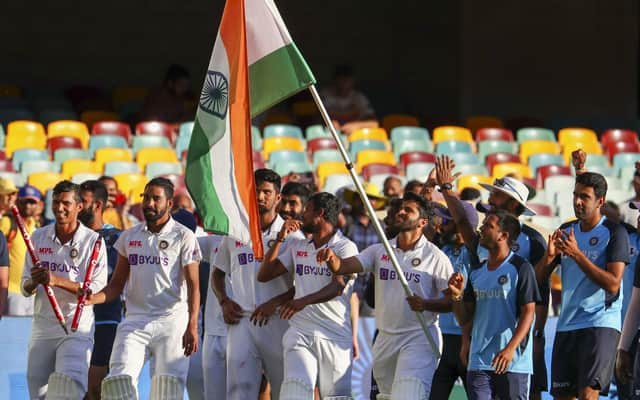Chris Waters - India’s was a great victory at the Gabba - but the greatest ever?


Some even termed it “The Greatest Test Series Ever”, thereby infringing the copyright belonging to England and Australia in 2005.
Others settled for such as “The Greatest Test Series Victory Away From Home”, or “The Greatest Test Series Victory By A Team In Unfavourable Circumstances”.
Advertisement
Hide AdAdvertisement
Hide AdIndia, indeed, were missing a sizeable contingent of their first-choice XI but, somehow, they stormed Fortress Gabba, where Australia had not lost a Test match since 1988, to close out a 2-1 series triumph – and that after they had been bowled out for 36 in the opening game in Adelaide and lost their captain, Virat Kohli, due to paternity leave.
Hyperbole aside, it really was a sensational win by the Indians – one up there, if not quite on a par with, the 2005 Ashes.
That series, however, had two key factors that set it apart – the fact that England toppled a truly great Australian team, perhaps the greatest of all-time with the likes of Shane Warne and Glenn McGrath (when the latter wasn’t busy treading on a ball), and also that they had not won the Ashes for the best part of two decades.
India, on the other hand, had also won 2-1 on their previous visit to Australia in 2018/19, and, despite all the factors against them this time, they were not up against a great team – more of a decent team with one or two great players in it, such as Steve Smith and Pat Cummins.
Advertisement
Hide AdAdvertisement
Hide AdThe history, the quality of the opposition, the breathless nature of several close games all made 2005 stand out as something truly remarkable; so much so, it is reasonable to question whether there will ever be a series quite like it again.
As hyperbole reigned after India’s win, with the world of Twitter almost going into meltdown, it struck me how prone we are to thinking that what we have just witnessed is “the best thing ever”.
In cricket, you can point to several other areas in which this is the case – most notably when someone takes a brilliant catch – say in the Big Bash, which the Twitterati inevitably hail as “the greatest catch that you will ever see”, as if the zillions of incredible catches in the long history of cricket have suddenly been put into the shade.
Match-winning hundreds might be similarly described, even five-wicket hauls for bowlers.
Advertisement
Hide AdAdvertisement
Hide AdIn Brisbane, Cheteshwar Pujara’s 56 – in which the former Yorkshire batsman faced 211 balls and soaked up a litany of blows in more than five hours at the crease – was proclaimed by some as “the greatest defensive innings of all-time”, one which laid the foundation for Rishabh Pant to seal a three-wicket win with a scintillating unbeaten 89.
Fair enough, but who now – especially in the theatre of Twitter – knows of Trevor Bailey’s famous rearguard with the Yorkshire batsman Willie Watson against Australia at Lord’s in 1953, or another Bailey act of defiance in the fourth Test of that series at Leeds?
Who now knows of Hanif Mohammad’s 337 for Pakistan against West Indies at Barbados in 1958, another contender for “the greatest defensive innings of all-time”, when “The Little Master” helped to save the game with his extraordinary heroics?
The trap of thinking that what you have just seen is the best thing that has ever been seen is an easy one to fall into, and all of us are guilty to some degree.
Advertisement
Hide AdAdvertisement
Hide AdBut those claiming that this Australia-India Test series was the best ever have not just the 2005 Ashes to consider, but also such famous series of yore as the 1936-37 Ashes (when Don Bradman helped Australia to win from 2-0 down), the 1960-61 series between Australia and West Indies, which featured the first tied Test, and even the 2000-01 India-Australia series, when India pulled off an astonishing 2-1 win against Steve Waugh’s men. For sheer drama and surprise, it could even be argued that that series was more incredible than the one just gone.
Similarly, when Dan Lawrence scored 73 and 21 not out on his England Test debut against Sri Lanka recently, some were saying that there could not have been a better performance by a player on Test debut. Really?
A chap called R.E. Foster, among others, might have something to say about that, considering that the England batsman scored 287 (still the highest score on Test debut) against Australia at Sydney in 1903.
But who now has heard of R.E. Foster – “Tip” to his friends?
Advertisement
Hide AdAdvertisement
Hide AdWho now – in the often superficial world of Twitter – stops to think that cricket might actually have started long before the 21st century?
It does make you wonder, not least when you hear summarisers on Test Match Special asking, when the name of S.F. Barnes cropped up the other day, “which team did he play for?” Er, try England – 189 Test wickets at 16.43 in the early part of the 20th century, one of the greatest bowlers there has ever been. If history tells us anything, it is that modern hyperbole is often misplaced.